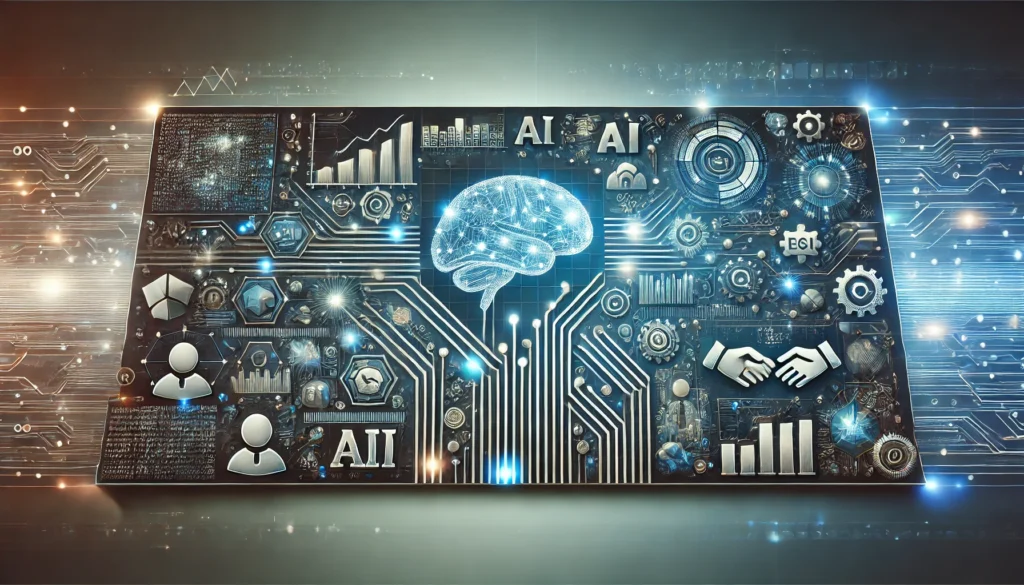The Role of Artificial Intelligence and Machine Learning
in Digital Transformation for Businesses

The rapid advancement of digital technologies has reshaped the landscape of modern businesses. Central to this evolution is the integration of Artificial Intelligence (AI) and Machine Learning (ML), which have emerged as pivotal components in driving digital transformation. AI and ML are revolutionizing traditional business processes, enhancing operational efficiency, and enabling data-driven decision-making. This article explores the profound impact of AI and ML on digital transformation, examining their applications, benefits, challenges, and future implications for businesses.
Understanding Digital Transformation in Business
The Role of AI in Business Digital Transformation
Machine Learning Applications in Business
Key Benefits of AI and ML in Digital Transformation
Challenges of Implementing AI and ML in Business
Future Trends of AI and ML in Business Transformation
Understanding Digital Transformation in Business
Digital transformation involves embedding digital technologies across every aspect of a business, leading to a fundamental shift in how operations are conducted and value is provided to customers. It goes beyond mere technological upgrades; it involves a cultural shift, requiring organizations to continually challenge the status quo, experiment, and adapt to the changing digital landscape. Key elements of digital transformation include cloud computing, big data, Internet of Things (IoT), and most importantly, Artificial Intelligence and Machine Learning
The Role of AI in Business Digital Transformation
Artificial Intelligence refers to the replication of human cognitive functions by machines, especially through computer systems. AI technologies, such as natural language processing, image recognition, and robotic process automation, have become instrumental in enhancing business operations. AI enables businesses to automate routine tasks, analyze large sets of data efficiently, and generate actionable insights. For instance, chatbots powered by AI are now widely used for customer service, providing quick and accurate responses and improving customer satisfaction
AI also plays a significant role in creating personalized customer experiences. By analyzing customer behavior and preferences, AI can predict future trends and help businesses develop tailored marketing strategies. This level of personalization increases customer engagement and loyalty, leading to higher revenue generation
Machine Learning Applications in Business
Machine Learning, a subset of AI, involves the use of algorithms and statistical models that allow computers to learn from and make predictions based on data. In the business context, ML is being used to solve complex problems, identify patterns, and make informed decisions without human intervention
Key applications of Machine Learning in business include
Predictive Analytics: ML models analyze historical data to predict future outcomes, aiding in risk management, customer retention, and demand forecasting
Recommendation Systems: Used by companies like Amazon and Netflix, ML-based recommendation engines analyze user behavior to suggest products or content, enhancing user experience and increasing sales
Fraud Detection: Financial institutions use ML algorithms to detect unusual patterns and anomalies in transactions, minimizing fraudulent activities
Supply Chain Optimization: ML helps in predicting demand, managing inventory, and optimizing logistics, reducing costs and increasing efficiency
Key Benefits of AI and ML in Digital Transformation
The integration of AI and ML in digital transformation offers several benefits to businesses
Enhanced Efficiency and Productivity: AI-powered automation reduces manual effort, minimizes errors, and speeds up processes, leading to significant cost savings and improved productivity
Data-Driven Decision Making: AI and ML provide deep insights from large volumes of data, enabling businesses to make informed and strategic decisions
Improved Customer Experience: AI-driven personalization enhances customer engagement by providing tailored services and support
Innovation and Competitive Edge: By adopting AI and ML, businesses can innovate and stay ahead of the competition by offering unique products and services
Scalability: AI solutions are scalable and can be customized to meet the growing demands of businesses, enabling them to expand their operations smoothly
Challenges of Implementing AI and ML in Business
Although AI and ML offer significant benefits, their implementation in business presents certain challenges:
High Initial Investment: Developing and deploying AI solutions require substantial investment in technology, infrastructure, and talent
Data Privacy and Security: The use of AI and ML involves processing vast amounts of sensitive data, raising concerns over data privacy and security
Lack of Skilled Talent: There is a shortage of professionals with the necessary skills to develop, implement, and manage AI and ML systems
Integration with Legacy Systems: Integrating AI and ML solutions with existing systems can be complex and time-consuming, requiring significant changes in the infrastructure
Future Trends of AI and ML in Business Transformation
The future of AI and ML in business transformation is promising, with continuous advancements expected in the following areas
AI-driven Decision Support Systems: These systems will provide more accurate insights, allowing businesses to make better strategic decisions
Autonomous Operations: AI and ML will enable fully autonomous operations in areas like manufacturing, logistics, and customer service, significantly reducing human intervention
Hyper-Personalization: Businesses will be able to deliver hyper-personalized experiences by leveraging advanced AI models that analyze real-time data
Ethical AI and Governance: With growing concerns over AI ethics, future trends will focus on developing ethical frameworks and governance models to ensure responsible AI usage
Conclusion
AI and Machine Learning are no longer optional technologies; they are essential components of any business’s digital transformation strategy. They provide opportunities to innovate, improve efficiency, enhance customer experiences, and gain a competitive edge. As businesses continue to navigate the complexities of digital transformation, leveraging AI and ML will be key to unlocking new possibilities and achieving sustainable growth in a rapidly evolving digital world